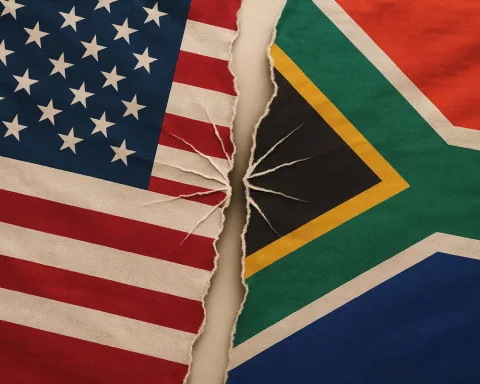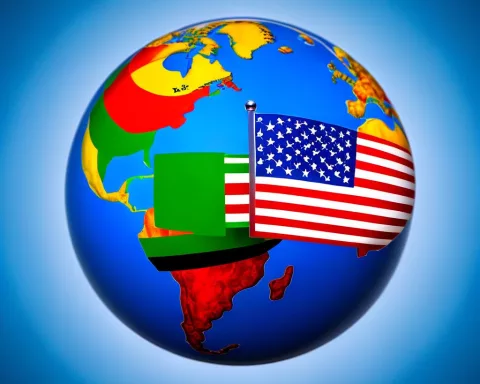Ebrahim Rasool, South Africa’s ambassador to the U.S., stirred up a storm when he critiqued American politics, leading to tensions with the U.S. government. His speech compared U.S. foreign policy to a telescope, suggesting that countries should align their actions with their values. U.S. Secretary of State Marco Rubio called Rasool ‘persona non grata,’ accusing him of race-baiting after he mentioned changing demographics in America. This sparked a heated debate about the connection between race and politics, showing how deeply personal and national identities can affect international relations. Rasool’s words highlighted the need for calm and thoughtful engagement, urging South Africa to navigate these diplomatic challenges wisely.
What caused the diplomatic tensions between the U.S. and South Africa involving Ebrahim Rasool?
Ebrahim Rasool, South Africa’s ambassador, faced diplomatic tensions after U.S. Secretary of State Marco Rubio declared him persona non grata. This followed Rasool’s speech critiquing U.S. demographic shifts and foreign policy, which Rubio labeled as ‘race-baiting,’ igniting a political controversy.
The Unfolding Diplomatic Drama
Diplomatic tensions rarely capture widespread attention unless they herald significant shifts in global alliances. Such was the scenario when Ebrahim Rasool, the South African ambassador to the United States, found himself embroiled in a diplomatic storm. U.S. Secretary of State Marco Rubio declared Rasool persona non grata, setting off a political earthquake with tremors felt around the world.
To grasp the essence of this diplomatic upheaval, one must delve into Rasool’s speech delivered on March 14, 2025, during a webinar hosted by the Mapungubwe Institute for Strategic Reflection (MISTRA). His address, dense with analytical depth and nuanced critiques, serves as the linchpin around which this diplomatic saga revolves.
Rasool initiated his discourse with a compelling metaphor: the telescope. He argued that effective foreign policy requires viewing through lenses shaped by both values and interests. This vivid analogy laid the groundwork for his broader thesis: South Africa has consistently aligned its actions with its core values, unlike some other nations that permit self-interest to dictate their values. In the politically charged atmosphere of the time, this subtle critique did not go unnoticed.
Analyzing Political Continuities and Breaks
Delving deeper, Rasool examined the continuities and divergences between the Biden and Trump administrations. He highlighted the pressure exerted on South Africa regarding the African Growth and Opportunity Act (AGOA) and geopolitical stances, attributing it to Biden’s policies. In contrast, he underscored Trump’s unique approach, marked by a blatant disregard for institutional norms. According to Rasool, Trump’s disruptive actions not only unsettled the global order but also fueled a domestic insurgency within the United States. This insurgency, he suggested, thrived amidst demographic shifts where whites might soon become a minority—a statement that incited Rubio’s vehement response.
Rubio’s reaction traced back to a Breitbart report that sensationalized Rasool’s remarks on demographic changes. The media outlet amplified Rasool’s comment about the U.S. electorate potentially becoming predominantly non-white, framing it as a provocative prediction. Rubio seized upon this narrative, labeling Rasool a ‘race-baiting politician.’ However, Rasool’s argument was far more complex, woven from threads of sociopolitical analysis and diplomatic foresight.
Rasool’s reference to demographic data was a deliberate part of a broader commentary on the socio-political transformations within the U.S. He connected these shifts to the rise of movements like MAGA, which he described as a supremacist reaction to demographic changes and a strategic maneuver against perceived losses of power. Rasool’s analysis went further, identifying figures like Elon Musk and Nigel Farage as symbols of a transnational export of this insurgent ideology.
A Rich Tapestry of Analysis
Against this backdrop, Rasool’s speech emerged as a rich tapestry of historical and contemporary analysis, reflecting a world in flux. His examination of Trump’s administration highlighted a departure from a rules-based order to one marked by abrupt, sweeping executive actions—a ‘shock and awe’ approach. This perspective resonated deeply, not as mere critique, but as an invitation to reexamine the evolving landscape of international relations.
Reflecting on South Africa’s position, Rasool underscored the country’s role as a beacon of anti-supremacist success. He pointed to the Government of National Unity (GNU) as a testament to peaceful transition and collaboration, often underappreciated domestically. Rasool posited that South Africa’s strategic dilemmas, encompassing geopolitical and economic issues, positioned it uniquely to navigate these turbulent waters.
His call to action was unequivocal: remain composed, engage with U.S. lawmakers, and strategically time interventions. Rasool emphasized the importance of not yielding to panic amidst diplomatic pressures. Instead, he advocated for measured responses that leveraged South Africa’s historical alliances and emerging partnerships.
Strategic Outlook and Pragmatic Engagement
Concluding his address, Rasool offered a pragmatic outlook on the G20 handover, urging a balanced approach between leveraging and respecting global institutions. He saw potential in Trump’s unorthodox methods—a ‘healthy disrespect’ that could be harnessed to reform the very structures it sought to challenge.
In the grand narrative of international diplomacy, Rasool’s words serve as both a mirror and a map, reflecting the complexities of our era while charting a course through them. His speech transcends a simple narrative, evolving into a strategic blueprint that reveals the intricate interplay of values, interests, and power defining our global stage.
Ultimately, Ebrahim Rasool’s insights provide a profound understanding of the diplomatic landscape, offering valuable perspectives on navigating the shifting sands of international relations. Through his articulate and thought-provoking discourse, Rasool not only highlights the challenges but also illuminates potential pathways for diplomats and policymakers alike.
“`markdown
What sparked the diplomatic tensions between Ebrahim Rasool and the U.S. government?
The tensions arose after Ebrahim Rasool, South Africa’s ambassador to the U.S., delivered a speech criticizing U.S. demographic shifts and foreign policy. Following his remarks, U.S. Secretary of State Marco Rubio declared him persona non grata, branding his comments as ‘race-baiting,’ which led to a significant political controversy.
What metaphor did Ebrahim Rasool use to describe effective foreign policy?
In his speech, Rasool used the metaphor of a telescope to explain that effective foreign policy should be guided by both values and interests. This metaphor emphasized the importance of aligning a nation’s actions with its core values, unlike some nations that prioritize self-interest.
How did Rasool analyze the differences between the Biden and Trump administrations?
Rasool highlighted the differences in their approaches to foreign policy, noting that the Biden administration exerted pressure on South Africa regarding the African Growth and Opportunity Act (AGOA). He contrasted this with Trump’s administration, which he described as having a blatant disregard for institutional norms, leading to disruptions in the global order and the rise of domestic insurgencies within the U.S.
What controversial demographic statement did Rasool make, and how was it received?
Rasool mentioned that white Americans might soon become a minority, a statement that sparked outrage from Rubio, who labeled him a ‘race-baiting politician.’ This remark was sensationalized by media outlets and framed as a provocative prediction, overshadowing the deeper sociopolitical analysis Rasool intended to convey.
What recommendations did Rasool give to South Africa regarding diplomatic engagement?
Rasool urged South Africa to remain calm and engage thoughtfully with U.S. lawmakers. He emphasized the importance of strategic timing in interventions and advised against yielding to panic in the face of diplomatic pressures, advocating for responses that leverage South Africa’s historical alliances and emerging global partnerships.
What was Rasool’s broader message regarding international relations?
Rasool’s speech presented a rich analysis of the evolving landscape of international relations, emphasizing the interplay of values, interests, and power. He called for a balanced approach to leveraging global institutions while also highlighting South Africa’s role as a beacon of anti-supremacist success and its unique position to navigate geopolitical challenges.
“`












